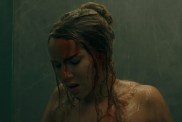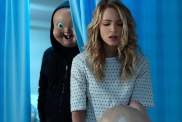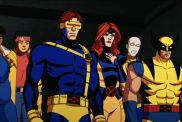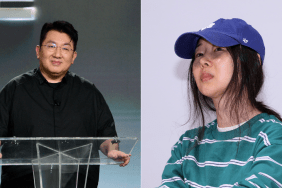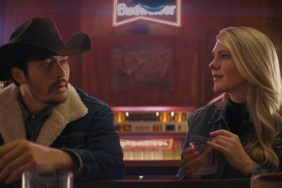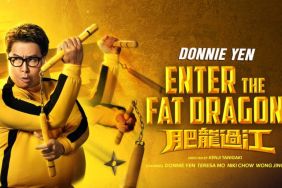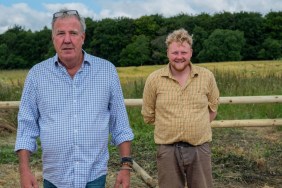Hitting theaters this Friday, Something Borrowed tells the story of Rachel (Ginnifer Goodwin), a New York lawyer whose life is going perfectly except for one small problem: She’s hopelessly in love with her longtime friend, Dex (Colin Egglesfield) who just so happens to be engaged to her best friend since childhood, Darcy (Kate Hudson). When one night together reveals that Dex feels the same way about her, Rachel is forced to figure out what relationships matter most in her life and risks either losing her one true love or the person she’s closest to.
Though audiences know Hilary Swank best as an Academy Award winning actress, Something Borrowed represents her latest creative work from the other side of the camera. Formed in 2007 with producing partner Molly Smith, 2S Films specializes in female-driven stories like Amelia and Conviction.
Smith and Swank spoke exclusively with ComingSoon.net about bringing Emily Giffin’s bestselling novel to the screen and how they hope to follow it up with an adaptation of the sequel, Something Blue.
ComingSoon.net: Which one of you came across the book first and what made you ultimately decide to adapt it?
Molly Smith: My little sister had given me the book. It was in 2005 or 2006 right when it came out. It was just a series of books that I loved. I was a big fan of Emily Giffin. Hilary and I partnered after I produced “P.S. I Love You” and we formed our production company, 2S Films. It was one of the first books that came to mind when we decided to start a slate of projects. I gave it to Hilary and it was the first thing that we optioned together.
CS: Hilary, what was it that drew you to producing? What made you want to get on the other side of the camera?
Hilary Swank: Well, there’s only so many stories that you can tell as an actor and I’m in the business because I love telling stories. I love the collaboration process and I love movies. It seemed like the natural next step. I had a first look deal at Warner Bros. and it was about to be up so I was either going to renew that contract or not and it was perfect timing because Molly was someone that I watched grow up in the business and she inspired me with her taste in projects and with her drive and her tenacity. So I said, “Let’s do this together.” I’m so thankful to be a producer with her.
CS: I would imagine that being a producer is a much harder job than being an actor because there’s so much that you’re sort of pulling something from the ether.
Smith: You have to wear so many hats as a producer. Hilary was a born producer anyway. What’s great is having an actor that has been on the other side of things. She’s able to step in and make every decision from casting to wardrobe to crew that we’ve worked with on various films. You have to switch gears from physical production to creative producing a lot. You make those decisions together.
CS: After you’ve got the rights to the book, what’s the first
step? Do you immediately look for actors?
Smith: It’s the screenwriter. We had to talk about who was going to adapt it.
Swank: Casting doesn’t come until way later.
Smith: We met a lot of writers on this, but Jennie Snyder was just great. She had a real twist on how to take a 400-something page book and turn it into a movie. Especially something with tricky subject matter like this and to do with such humor and heart and twists and turns. We worked on the script for about two years before we got to a place where we were ready.
CS: Part of that trickiness seems to be that you’ve got a lot of characters with very negative aspects to their personality and it’s a tough balance to keep them likable.
Smith: That’s right. We really just wanted to do the book justice. Because in the book, the novel, you have the chance to be in Rachel’s head and hear her inner thoughts. Adapting that for the screen proved to be a little difficult because we didn’t want to do that with voiceover. We were just determined not to do voiceover. We really wanted you to meet this group of friends and form your own opinions and decisions about the choices they make and how they live their lives. I think that Emily gave us such rich and real and flawed characters. That’s real life, so it’s very relatable. We had so many people from the test audience after the first time the movie played go, “That was really refreshing because that was like my group of friends on the screen!” That was such a compliment to hear people say. They felt like, “I’m Rachel” or “I’m Darcy.” or “My best friend is Darcy” or “I have an Ethan in my life.” That’s, I think, a really high compliment.

CS: Luke is kind of an unlikely choice for a director. Molly, he was saying that you went after him specifically.
Smith: He had done “The Girl Next Door,” so we were a fan of his work. We sought him out and wanted to know what he was up to. He had several things in development. Obviously, he produced “Role Models”.
Swank: Molly really, really believed in him. She was like, “I really want you to hear what he has to say because I really believe that he’s going to be great and has the vision to see this through.”
Smith: He also said, one of the first times that I met him before Hilary had even met him, over coffee, “I will die if I don’t make this movie.” I was like, “I want that guy in my court right now!” He’s great. He came and pitched for Hilary and I and he had such passion for this material. I’ll take that guy over anybody. He’s so great and so much fun to work with. It was a great collaboration.
CS: Was it always the thought that you’d just try to do the
first book?
Swank: No, we’re still hoping to do both.
CS: I mean as the first film. Was there ever the attempt to combine both books into one film?
Smith: Yeah, actually when we met with early screenwriters, that was a question that kept coming up. But they’re two totally different stories. This is Rachel sort of coming into her own. The sequel really follows Darcy coming into her own. It’s about her arc.
CS: There’s a tease in this one, too, if you stay through the end credits that really changes the outcome of the film.
Smith: Exactly! I’m glad that you got that. We kind of did that as a sort of tip of the hat to the fans in the hopes that there’s more to be seen.
CS: Is the romantic comedy genre something that specifically interests you as producers? What else is coming up?
Swank: We want to do everything that we feel passionately about. Mostly female-driven projects. Being women, we relate to that. You don’t see enough of it, I think.
Smith: I feel like, with romantic comedies, it can be a challenge to make them original. You feel like you’ve seen it a million times and you’ve already seen the formula. It’s just brand-new actors. So what really drew us to Emily’s story and Emily’s book is that we had the chance to do something fresh. It’s a genre where it feels like there hasn’t been much originality in the last several years, at least. That was a challenge that we put on ourselves. How do we make something fresh and original and a little edgy? I think we’ve done that, which we’re proud of.
CS: It is interesting that it’s a wedding movie, but it’s sort of wedding-adjacent. It’s not really about the event itself.
Swank: Not at all, really. I’m glad you’re saying that because some people might think that and correlate that with some other films they’ve seen in the past and it’s just not that.
CS: Were there any specific genre tropes that you wanted to avoid?
Smith: Definitely. We wanted to dodge the dueling best friends. It’s actually a really complex friendship with sort of a neediness and insecurity between these two girls and this lifelong friendship. I think that just posing the sort of moral dilemma question that the movie poses — which is “What would you do if you found yourself in this situation?” — already dodges a lot of cliches, but we thought that at every turn. Even with the friendships. With the Rachel and Ethan friendships, we were very careful about really making this real and getting it so people could go, “You know, I really had a friendship like that.” Sometimes lines get a little blurred. I think that we explore a lot of interesting themes in this movie.

CS: It does manage to go from very dark to light again and one of the best examples is the impromptu dance number. Can you talk about when the idea of that came about?
Smith: Isn’t that great? That wasn’t from the book, but, being girls and growing up, we knew that every girl did that. Everything girl has her dance routine that you did with your friends and you remember every move and probably still remember to this day. We were just determined to put that in.
Swank: When it comes in the movie, too, it’s a great opportunity to show the lifelong friendship of these girls. All the audiences who have seen this just love that, too. It’s a great bonding moment for the girls.
CS: All the characters have their darker side, but Kate Hudson gets to really sort of embrace a villainous streak in a fun way in this. Is that something that, speaking as an actress, is enticing to bring someone aboard the project?
Swank: I don’t know if I can say “entice,” but, as an actress, I certainly have an insight into how I can see the character and how you can talk it out and beat around. Kate was working on something when we wanted to make the offer and I know what it’s like when I’m working on something. It’s hard to wrap my head around getting out of that character that I’m playing. The movie that she was doing was very different from this. We wanted to be patient with her and the work that she was doing and, when it came down to it, she didn’t have time to read the books and the screenplay was still finding its way. It always is until you’ve locked picture. So Molly and I sat down with her and let her know where the character arc went after “Something Borrowed” because she didn’t get to read the screenplay of “Something Blue.” We didn’t have that. So we talked it out. We talked creatively and visually about how we saw the character. We believe in the actors that we bring on board and we want to hear their opinions to create the most real and multi-faceted character possible. Of course as an actor, I can appreciate that. You don’t want to come onto a movie where someone says, “This is how it is and this is the character. It’s all on the page and if you don’t see it, too bad.” You want their ideas to be a part of it. Kate and Ginnifer and John — all of them — are very hands on with how they see things and we appreciate that.
CS: Is it hard as a producer, then, to know when it’s necessary to be hands off?
Swank: Yes, but, ultimately, we’ve been with it so long that we know what we need to get. You have this vision and everyone is a part of it, but we’ve been with it the longest. So if there’s something we feel is missing, the great thing about working with talented people is that they’re bringing stuff you didn’t see as well. You can say, “Oh my gosh! I never saw it that way! What a great idea!” But, in turn, if they’re doing something and you don’t feel like they’re really getting it, it’s your job as a producer to say, “I don’t think we have it yet. Let’s try this and let’s try that.” That’s what making movies is all about.
Click here to check out ComingSoon.net’s previous interview with the director of Something Borrowed, Luke Greenfield.
